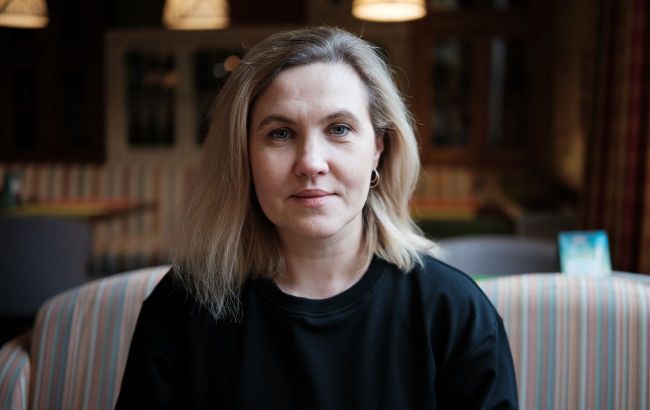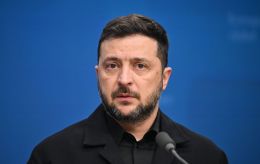'Deportation is just one of many problems children experience because of war' - Ukrainian Child Rights Network Head
 Daria Kasianova, Head of the Board of the Ukrainian Child Rights Network, Director of SOS Children's Villages Ukraine (Photo: Vitalii Nosach, RBC-Ukraine)
Daria Kasianova, Head of the Board of the Ukrainian Child Rights Network, Director of SOS Children's Villages Ukraine (Photo: Vitalii Nosach, RBC-Ukraine)
With the beginning of a full-scale invasion, Russia continues to deport Ukrainian children from the occupied territories. Some of them are even given Russian citizenship without their knowledge. Thousands of children in the occupied areas are still at risk of being deported.
Deportation and illegal displacement are not the only problems that children have had to endure due to Russia's aggression. Some witnessed the deaths of parents and friends, while others experienced the destruction of their homes. Even after the return of children to Ukraine, much work is needed to normalize their psychological state.
Daria Kasianova, Head of the Board of the Ukrainian Child Rights Network, Director of SOS Children's Villages Ukraine, in an interview with RBC-Ukraine, talks about the return of children from the Russian Federation territory, evacuation from conflict zones, and adoption. Here are crucial theses from the conversation.
Thousands of children need to be evacuated from the combat zone
From the first days of the Russian invasion, we have been assisting the state in evacuating children from those territories where it was possible to do so. This includes the Donetsk, Luhansk, Kharkiv, and other regions. Zaporizhzhia and separately Kherson were particularly challenging because parts of the Kherson region were occupied in the early days.
Often, employees of orphanages refuse to leave because, for example, their relatives cannot leave. Additionally, in family-type children's homes, there is no transport capable of taking five or more children, not to mention dogs and cats. Plus, it's very difficult to transport children with disabilities. How do you lower them if the elevators aren't working? And how do you transport them further without cars and volunteers?
Regarding children in families, children from the front-line territories cannot evacuate independently. Simply taking and removing children would violate international humanitarian standards. According to the requirements, a child's evacuation should occur with parents. We cannot break up families. So, we work to reassure parents and help them decide to evacuate.
The scariest case I remember is when volunteers posted on Facebook. Unfortunately, parents often refuse to leave. I've seen videos where they tried to persuade a man in Donetsk to leave with his teenage children, but he declined, saying he wouldn't go and the children would stay with him. The next day, there was shelling, the father died, and the children were with him all that time. After a few days, volunteers evacuated the children to a safe area. There are cases when children who have already left themselves sought our help. They said their parents refused to go, so they evacuated independently.
How they search for and return children illegally taken by Russia
Parents or legal representatives of children and children who want to return to Ukraine contact us as a non-governmental organization. We assist them and, of course, cooperate with Ukrainian government structures: the Ministry of Reintegration of Temporarily Occupied Territories, the Ombudsman's office, and various human rights organizations, including international ones.
We search for information about children in various open sources. Previously, more information was available; now, it's increasingly difficult to find. We search, pass the information to government structures, and work together. We try to determine if the child has parents, legal representatives, or grandparents. Whether the child has any relatives at all. Then, we look for ways to return the child.
Physical return is challenging. I honestly can't remember straightforward returns of children taken to Russia. There is no difference today whether a child is on an occupied territory or in Russia. The logistics are equally highly complicated. It's very difficult to predict how much time the return will take.
A "foster" family made a Russian passport for a boy without his knowledge
There are cases when the return procedure took 45 days. Once, a sister went for her brother, which took 17 days. This only includes some of the approval processes. Crossing borders is particularly challenging: checks and interrogations lasting 5-8 hours. Not everyone can endure this.
In logistics, many things can change multiple times; everything can go differently. In some cases, a relative went for a child to Anapa but took the child from Voronezh.
There was also a situation where we had all the approvals to take a child from the occupied territory in the Luhansk region. However, when crossing the border, it was discovered that the child had Russian citizenship. The teenager himself was unaware of this fact. Russian laws were already being applied to him, and the documents held by his sister were unfortunately no longer considered legal.
The boy was in a foster family, and most likely, that Russian family had obtained his passport. He only found out about it when crossing the border. Although his sister had his birth certificate and all the documents, additional documents were often demanded. This clarification usually happens after relatives have received all the confirmations, bought tickets, and arrived at the location.
"More than official figures." How many children Russia has illegally deported from occupied territories
According to the data provided by Ukraine, almost 19,500 children are considered deported and illegally moved by Russia during the war. However, when we return to the children, they tell us about other children they saw there. And there is no information about them in the databases. So, most likely, there are more of them.
In addition, the occupied parts of Kherson, Zaporizhzhia, and other regions. There, children are also at risk of being deported. Some have lost their parents, and the child lives with neighbors. Neighbors are afraid to initiate guardianship because it requires dealing with "Russian" authorities and acting according to supposed "Russian" legislation. People don't want to do this, and without such documents, it's impossible to take the child out. Also, without documents, the child will not be accepted into school, they may be sent to an orphanage in Russia or in occupied Crimea.
I think Ukraine will file a separate case with the International Criminal Court, where they will prove the crimes of adopting our Ukrainian children illegally. There was a public case when the leader of the "A Just Russia" party, Sergey Mironov, and his wife secretly adopted a girl taken from Kherson.
To search for abducted children, a third country needs to be involved
In reality, the interest in the topic of children's deportation at the international level is very high. Some human rights organizations search for and analyze such cases to prove all these crimes. The Parliamentary Assembly of the Council of Europe (PACE) has a separate committee to find practical solutions for children affected by the war.
I hope a third country will appear that will send people to verify information about these children in the territories of the Russian Federation and Belarus, in the occupied territories. We need an intermediary to search for children and return them in larger groups, not one by one. Children are growing up, and there will be a huge job with their worldview. The longer they stay there, the more difficult it will be to rehabilitate and reintegrate them later.
Unfortunately, deportation or illegal relocation is often not the only complex circumstance these children have experienced. Some witnessed their parents' deaths. Someone's home was destroyed before their eyes. These children themselves have injuries, they lost friends. Therefore, the return is only a tiny part of the work, after which an even more important one begins – rehabilitation and reintegration.
How the adoption procedure in Ukraine has changed during the war
Many children who were eligible for adoption were in Luhansk, Zaporizhzhia, Mykolaiv, and other regions when the invasion began, where hostilities began. At the onset of the war, children were being evacuated, courts were not functioning, and many judicial institutions were simply destroyed. Adoption issues are resolved through the court, and physically, it becomes impossible. But guardianship over the child could be formalized. These processes took place where there were no active hostilities.
Nowadays, many people have started thinking about adoption. Because it is truly a tragedy when children lose their families. However, older children aged 10 and above often remain overlooked. And children from the same family as well: by law, they cannot be separated, and not everyone wants to adopt several children. It is essential to understand that such children are also waiting for families.
Often, those who want to adopt children already have a similar family history – someone's father or mother grew up in an orphanage. Someone has something related to orphanhood. But one way or another, in such families, they understand that it is normal when, due to unavoidable circumstances, a child grows up outside the family, and they know that such a child needs to be provided security. They can accept them as their own.
It's very good that well-known people, such as bloggers, are now popularizing adoption stories. Adoption is not a question of heroism. It is a question of our society's normalcy: if a child's life has turned out this way, then we need to have the responsibility to accept them and ensure that the child grows up in safety, care, and love.

